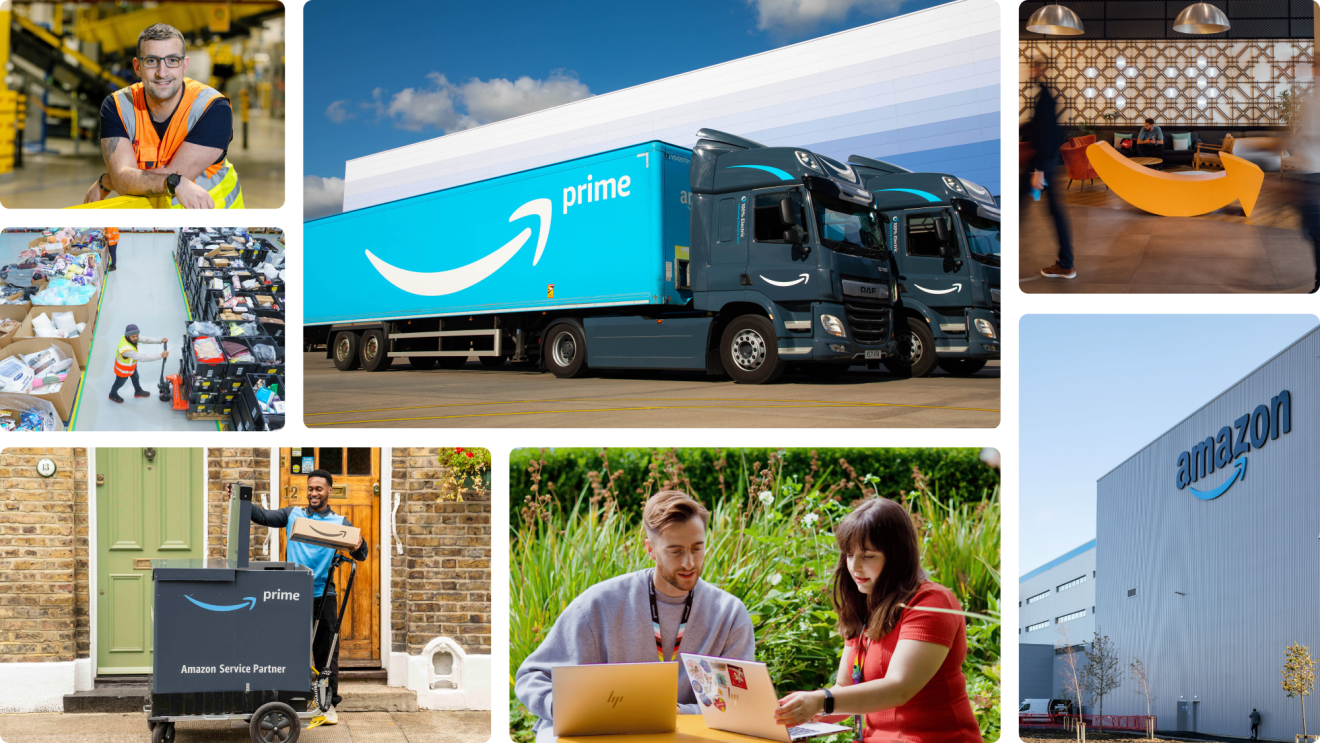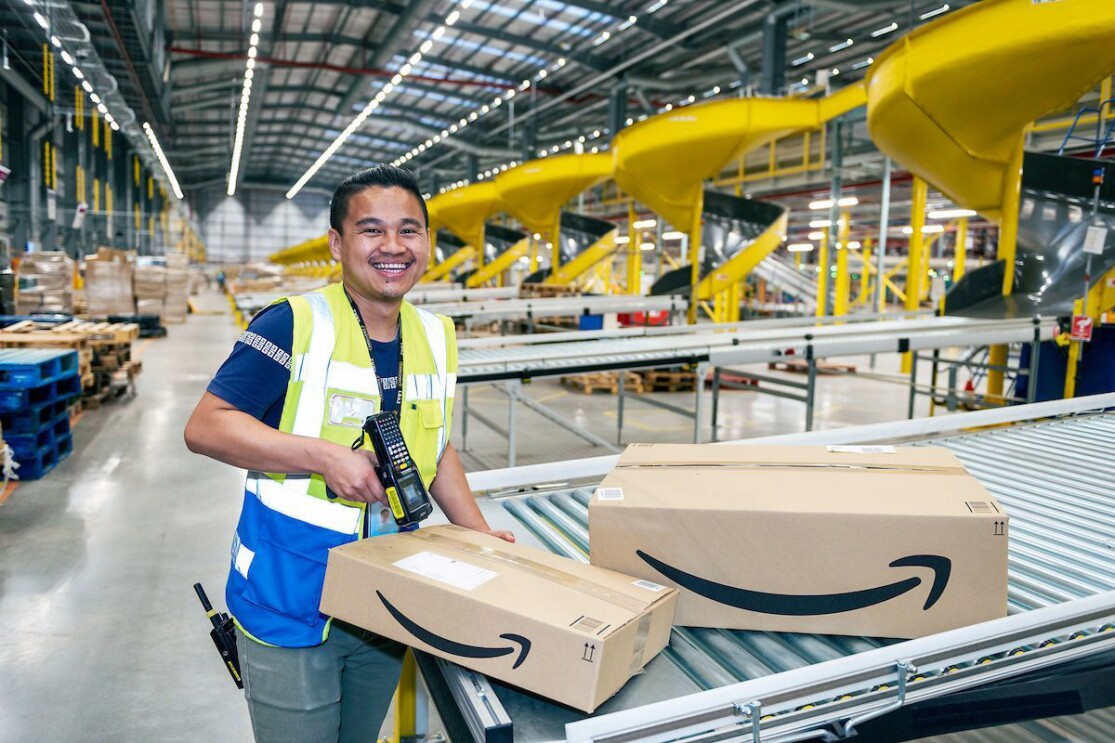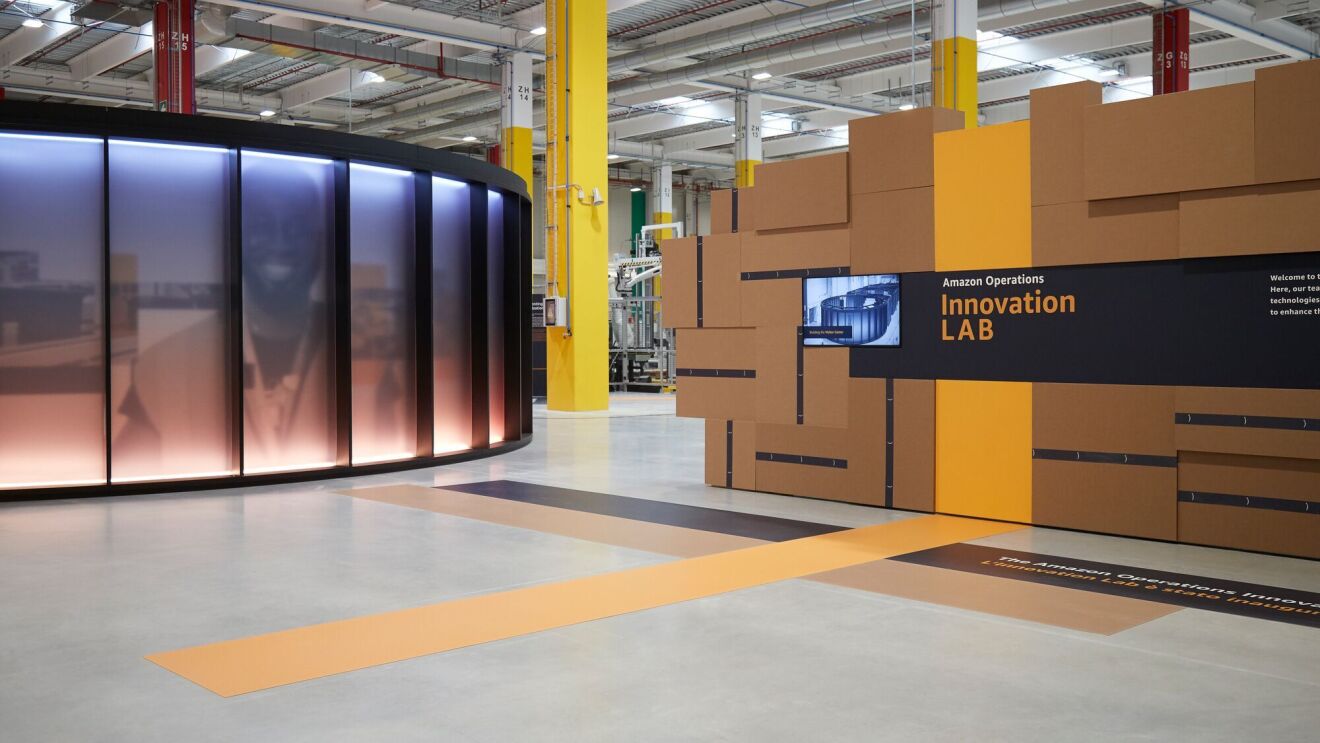Amazon spent the last 25 years building Amazon.com. It now serves over 300 million active customers a wide selection of goods at competitive prices. You may be one of them.
But different customers have different needs.
Amazon has long known that businesses and organisations were shopping for office supplies and other goods in bulk on its store. To better serve them, the company launched Amazon Business in 2015.
“Everything we do at Amazon starts with the customer, and we kept asking ourselves, ‘How can we better serve those business customers?’” says 20-year Amazon veteran Alexandre Gagnon, vice president of Worldwide Amazon Business. “The procurement space is ready for innovation. We have leveraged the size, expertise, technology, and infrastructure we have built at Amazon, and adapted it for businesses and organisations of all sizes.”
More than 6 million customers are now buying on Amazon Business. This includes small and medium-sized companies like the family-owned Red River Brewing Company in New Mexico, as well as large companies and institutions. Ninety-six Fortune 100 companies use Amazon Business, including Intel and Citi, as well as organisations like Johns Hopkins University and Seattle Children’s Hospital, and U.S. governmental entities, including the state of Utah, the U.S. Air Force, and the United Service Organisations (USO).
“Amazon Business is constantly innovating on the behalf of its customers—working on solutions and integrations that make procurement more efficient, reducing overhead and manual processes,” Gagnon says. “Amazon Business supports integrations with Coupa and over 100 other procurement, payments, and ERP systems. We also support purchasing directly on Amazon.com for organisations that do not rely on an e-procurement system,” he adds.
Despite the progress and growth of Amazon Business, the energy inside makes it feel like a startup with a lot of room to expand further. Amazon Business director Todd Heimes says there are millions of small businesses around the world, and they spend trillions every year on supplies and procurement.
“We are just getting started,” Heimes adds.
Here are some answers to frequently asked questions about Amazon Business.

Who can open an Amazon Business account?
Businesses and organisations of all sizes—a local hair salon, global corporations, schools, non-profits, hospitals, and government agencies—can open an Amazon Business account. The account is free, and there’s no spending minimum.
Businesses and organisations of all sizes—a local hair salon, global corporations, schools, non-profits, hospitals, and government agencies—can open an Amazon Business account. The account is free, and there’s no spending minimum.
How does Amazon Business work?
Amazon Business gives organizations of all sizes the ability to buy from a large selection of hundreds of millions of items directly from the Amazon Business store, which has the same easy-to-use and intuitive interface as Amazon.com.
Amazon Business gives organizations of all sizes the ability to buy from a large selection of hundreds of millions of items directly from the Amazon Business store, which has the same easy-to-use and intuitive interface as Amazon.com.
“One of the best things we have as a tailwind for Amazon Business is all of the work we've done for the last 25 years for consumers on Amazon,” Heimes says. “We've got a catalogue with a wide selection, a world-class fulfillment capability, and a great customer experience that you're used to. It’s easy to use with no training necessary. The search experience, the reviews, the shopping cart, and other popular features are all the same, and on top of that we’ve built business-specific features that allow companies of all sizes to integrate their procurement policies into the buying process.”
What does Amazon Business offer beyond vast selection, low prices, and convenience?
“We are so much more than a B2B store or a procurement organisation,” says Aster Angagaw, vice president and head of commercial, public, and strategic sector at Amazon Business. “Amazon Business is designed to be flexible and can support customers of all shapes and sizes. We continuously develop scalable solutions by customer size and industry vertical. We work with our customers to solve their biggest procurement challenges by giving them incredible technology such as Amazon Business analytics and Guided Buying, available with eligible Business Prime memberships.”
“We are so much more than a B2B store or a procurement organisation,” says Aster Angagaw, vice president and head of commercial, public, and strategic sector at Amazon Business. “Amazon Business is designed to be flexible and can support customers of all shapes and sizes. We continuously develop scalable solutions by customer size and industry vertical. We work with our customers to solve their biggest procurement challenges by giving them incredible technology such as Amazon Business analytics and Guided Buying, available with eligible Business Prime memberships.”
“Amazon Business lets our customers use a set of policies or rules to ensure that certain types of products they buy meet those requirements,” Heimes says. “So, you could say, ‘I want to buy local,’ ‘I want to buy products with sustainability certifications,’ ‘I want to buy from veteran-owned or diverse suppliers.’”
Angagaw says that business owners and procurement staff are using Amazon Business for its end-to-end solution which provides tools and analytics that give them control, visibility, and insight into purchasing, supply chain, and other activities. “It's about making sure that Amazon Business gives flexibility to customers so that they focus their time on what matters most to them. This means an organization can ensure they are spending the money where they want to spend it in the way they want to spend it, and that they have control over who spends that money within their organization,” she explains. “Because of our end-to-end solution capability, our customer-facing teams work with the largest enterprises to understand their unique business procurement needs and build tailored solutions that best fit their business, requirements, and unique purchasing criteria.”
“Smart business buying is really the culmination of machine learning and artificial intelligence we are bringing to bear on the procurement space to help our customers buy and supply their needs in a smart way, to free them up to do what they really want to do, which is run their business,” Heimes adds.
Does Amazon Business have a Prime membership program?
Yes. Business Prime is a popular membership similar to Amazon Prime but with business specific benefits tailored to business buyers. It provides benefits like free shipping on eligible items, deals, and other features like Guided Buying and Spend Visibility. The Business Prime membership includes benefits and pricing* plans tailored for various business sizes.
Yes. Business Prime is a popular membership similar to Amazon Prime but with business specific benefits tailored to business buyers. It provides benefits like free shipping on eligible items, deals, and other features like Guided Buying and Spend Visibility. The Business Prime membership includes benefits and pricing* plans tailored for various business sizes.
*Pricing varies across regions.
How do customers use Amazon Business?
Angagaw says Amazon Business helps large and small customers leverage what they're doing today in the area of spend. But Amazon Business can also help them source products with sustainability certification or goods sold by local, diverse, and other businesses. (See “Who sells on Amazon Business?” for more details.)
Angagaw says Amazon Business helps large and small customers leverage what they're doing today in the area of spend. But Amazon Business can also help them source products with sustainability certification or goods sold by local, diverse, and other businesses. (See “Who sells on Amazon Business?” for more details.)
“We are really giving customers control and visibility of these purchases and knowing where they spend their money,” she explains. “If you're a teacher and you want to be able to buy specific books or tools for your class, you no longer have to go through a series of people in the process. You can go to the Amazon Business store, and you will be able to purchase what you need for your students. Utilising the set budget that is designed for you, you can actually spend it over a semester or a year or a month—however you want to manage it.”
These benefits also translate to tangible savings. “We make it really easy for them to procure at competitive prices and save money that can be then reinvested,” Gagnon says.
How do small business benefit from shopping on Amazon Business?
Amazon Business is a B2B store with hundreds of thousands of sellers competing to offer a wide selection of products at competitive prices with the convenient delivery experience you are used to from Amazon.
Amazon Business is a B2B store with hundreds of thousands of sellers competing to offer a wide selection of products at competitive prices with the convenient delivery experience you are used to from Amazon.
“It offers small businesses and organisations the opportunity to reduce costs and improve their efficiencies, so that they can focus on running their business,” Heimes explains. “All of the conveniences we take for granted as consumers now are available to business customers.”
What attracts large customers to Amazon Business?
Heimes says that “digital procurement”—like shopping for supplies on Amazon Business — is a new concept for large organisations. He says that large businesses typically negotiate and buy from a limited set of suppliers. Amazon Business enables them to access hundreds of thousands of suppliers in one store.
“It's a really big opportunity for those large organisations,” he adds. “It allows them to become much more efficient, reduce costs, and streamline their suppliers, which is a huge benefit to them.”
“Sometimes we forget all the great things that Amazon.com offers to consumers that generally don't exist in the business world. Simple things, like knowing when items are going to get delivered. On that note, we can deliver millions of items next day,” Heimes says.
Heimes says that “digital procurement”—like shopping for supplies on Amazon Business — is a new concept for large organisations. He says that large businesses typically negotiate and buy from a limited set of suppliers. Amazon Business enables them to access hundreds of thousands of suppliers in one store.
“It's a really big opportunity for those large organisations,” he adds. “It allows them to become much more efficient, reduce costs, and streamline their suppliers, which is a huge benefit to them.”
“Sometimes we forget all the great things that Amazon.com offers to consumers that generally don't exist in the business world. Simple things, like knowing when items are going to get delivered. On that note, we can deliver millions of items next day,” Heimes says.
Amazon Business also helps business customers find competitive pricing for large orders.
“If you want to buy 500 black chairs, we will take that quote, send it out to sellers we know sell chairs, and give them the opportunity to bid on that order,” Heimes says. “It’s called a request for a ‘quote,’ and it’s our offering to address our customer's forecasted and large purchase needs.”
Who sells on Amazon Business?
Amazon Business offers hundreds of millions of products on its store. Most selling partners who sell on Amazon.com are automatically included in the Amazon Business store too.
Who sells on Amazon Business?
Amazon Business offers hundreds of millions of products on its store. Most selling partners who sell on Amazon.com are automatically included in the Amazon Business store too.

The Amazon Business teams also identify sellers with products that may be popular with business customers, then work to add their selection. “We’ve had personal paper shredders on Amazon.com forever, but we’ve now engaged sellers to secure industrial models to sell on Amazon Business,” Heimes explains.
How do small and diverse businesses benefit from selling on Amazon Business?
Customers can use the Amazon Business store to not only spend their dollars frugally, but also in ways that support their communities.
Customers can use the Amazon Business store to not only spend their dollars frugally, but also in ways that support their communities.
“A good example of this is when a local city government came to us and asked to keep their procurement spend within their local community. We worked with them to ensure that local businesses were identified as preferred suppliers so the spending for their organisations was staying within their community,” Angagaw says. “We are able to do this because if you qualify as a certified small, black-, or woman-owned business, we integrate those qualifications from the federal government, or other standard-defining organisations, and design tools so that any business owner or procurement officer at a large entity can direct their customers to support those specific businesses.”
Angagaw adds that it can be challenging for large organisations to interact with small businesses given their processes and system requirements.
“We facilitate that, and I think it is exciting to be able to make that connection between small businesses and corporations,” she says. “Our purpose is to give access for diverse, small, and local sellers to be able to interact with a large organisation.”
The U.S. Air Force is a good example. Keen to buy more goods from small and local businesses, and keep and create jobs in their communities, Amazon Business enabled Air Force procurement staff to access a database of more than 100,000 small businesses and check whether any local small business within 50 miles of any AF base were selling the relevant supplies.
There were thousands of them. The Air Force has made 7,600 purchases from 2,600 local small businesses through Amazon Business. It said that $1.29 million went to small businesses, including woman-owned, veteran-owned, and businesses in historically underutilised business zones.
“It's exactly like ticking a box. You set a rule—‘I want my users to buy from a local supplier,’—and then that selection will be reduced down to just that local suppliers’ products when that user is trying to make a purchase. It's very much about putting that type of control and those abilities in the hands of our customers.”
Where is Amazon Business available?
Amazon Business started in the U.S. and since expanded to Canada, the UK, Germany, France, Italy, Spain, Japan, and India.
Amazon Business started in the U.S. and since expanded to Canada, the UK, Germany, France, Italy, Spain, Japan, and India.








